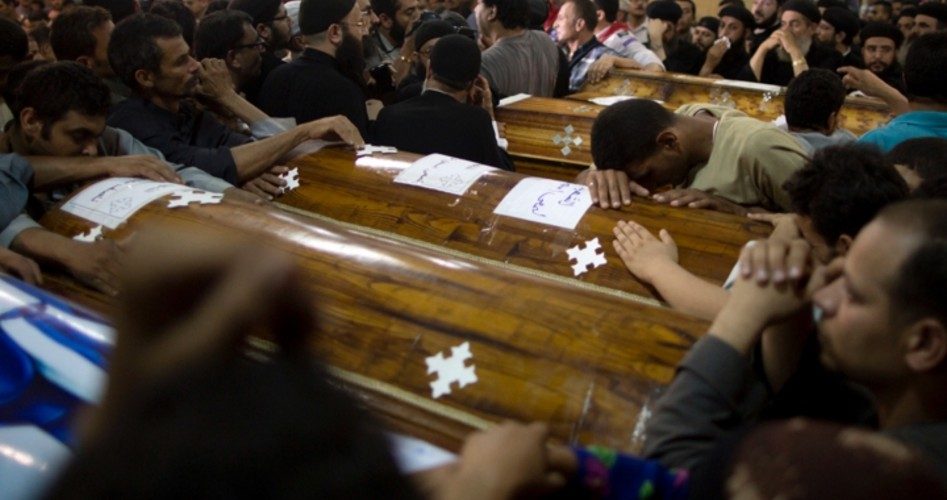
Islamic State terrorists (ISIS) have claimed responsibility for the attack Friday on a group of Coptic Christians in Egypt that killed at least 29 and left more than 20 others wounded. In a statement following the attack, ISIS leaders claimed its terrorists were responsible for the attack, and Egypt’s military countered immediately with an attack on what it said were ISIS “terrorist camps” in eastern Libya.
The Coptic Christians were on their way to pray at the remote monastery of Saint Samuel the Confessor, about 140 miles south of Cairo. Eyewitnesses to the attack said that masked gunmen opened fire on a bus filled with the victims after stopping the vehicle. One report said that as many as 10 attackers dressed in military uniforms drove up in three trucks, stormed the bus, demanded that the passengers recite the Muslim profession of faith, and then opened fire. Three children on the bus were reportedly among the survivors.
Coptic Christians, which make up about 10 percent of Egypt’s population of 92 million, have been under increasing attack from radical Muslims over the past several months. At least 70 have been killed since December in attacks claimed by ISIS at Coptic churches in the cities of Cairo, Alexandria, and Tanta.
In February ISIS released a video in which it called Egyptian Christians its “favorite prey” and told its followers that under Allah’s orders they were obligated to “kill every infidel.”
Egypt’s President Abdel-Fattah el-Sissi ordered the retaliatory attack on ISIS strongholds in Libya shortly after learning of the attack. “What you’ve seen today will not go unpunished,” he said in a televised address. “An extremely painful strike has been dealt to the bases.” He added that “Egypt will not hesitate in striking any camps that harbor or train terrorist elements whether inside Egypt or outside Egypt.”
Following the attack President Donald Trump issued a statement vowing to crush “evil organizations of terror.” In the statement Trump condemned all terrorists who “engaged in a war against civilization” and expressed his anger over the “merciless slaughter of Christians in Egypt.”
TheGuardian.com noted that “Egypt’s Coptic church has traditionally preserved close ties to the Egyptian government, seeking protection as the country’s largest minority. Bishop Makarios, who has previously criticized the government for similar security failures, praised the government’s response to Friday’s attack.”
Makarios said the latest ISIS attack represents a “natural escalation” in the terrorist group’s campaign against Christians after President Sisi called a state of emergency in April following two suicide bombing attacks against Coptic churches killed at least 45 individuals. “Security around monasteries and churches is tight, so attackers are thinking of other ways to hit the same target far from secure places,” said Makarios.
Some high-profile Muslim entities in Egypt were among the first to condemn the attack, which occurred the day before the Islamic holy month of Ramadan. Dar al-Ifta, considered a major Islamic authority in Egypt, released a statement saying that “these traitors violated Islam’s principles by spilling blood and terrorizing others, and broke their vows [of protection] by targeting Christian brothers, who are our partners in the homeland.”
Another Egyptian Muslim leader, Al-Azhar Grand Sheikh Ahmed al-Tayyeb, said in a statement that “neither Muslim nor Christian approves of the Minya incident, which targets stability in Egypt. I call upon all Egyptians to unite in the face of this brutal terrorism.”
Statements of sympathy and support from Christian leaders poured in to the Coptic community following the latest attack. A telegram from the Vatican read: “Deeply saddened to learn of the barbaric attack in central Egypt and of the tragic loss of life and injury caused by this senseless act of hatred. Pope Francis expresses his heartfelt solidarity with all those affected by this violent outrage. He assures their grieving families and all who have been injured of his ardent prayers, and he pledges his continued intercession for peace and reconciliation throughout the nation.”
Bishop Anba Angaelos of the Coptic Orthodox Church in the United Kingdom said that he was “speechless” after hearing of the attack. Similarly the UK’s Archbishop of Canterbury Justin Welby, who earlier this month had hosted Egypt’s Coptic Orthodox leader Pope Tawadros, said he was “heartbroken by the news of another awful attack on men, women, and children, murdered because of their faith in Jesus Christ.” He added that “today we stand with all those who fear for their lives because of their faith. We stand with Pope Tawadros and all the Christians of Egypt, in prayer and solidarity.”
Protestant evangelist Franklin Graham, whose organization Samaritan’s Purse regularly responds to disasters across the earth, tweeted: “Pray for the families of the more than 26 Coptic Christians killed by gunmen in Egypt today.”
And Catholic Cardinal Donald Wuerl of Washington, D.C., encouraged fellow believers that “our response to this most recent atrocity is to turn to our Lord Jesus Christ, whose eternal love triumphs over suffering and evil and turns the darkness of death into the dawn of new life.”
Photo of funeral service for Coptic Christians killed in bus attack: AP Images



